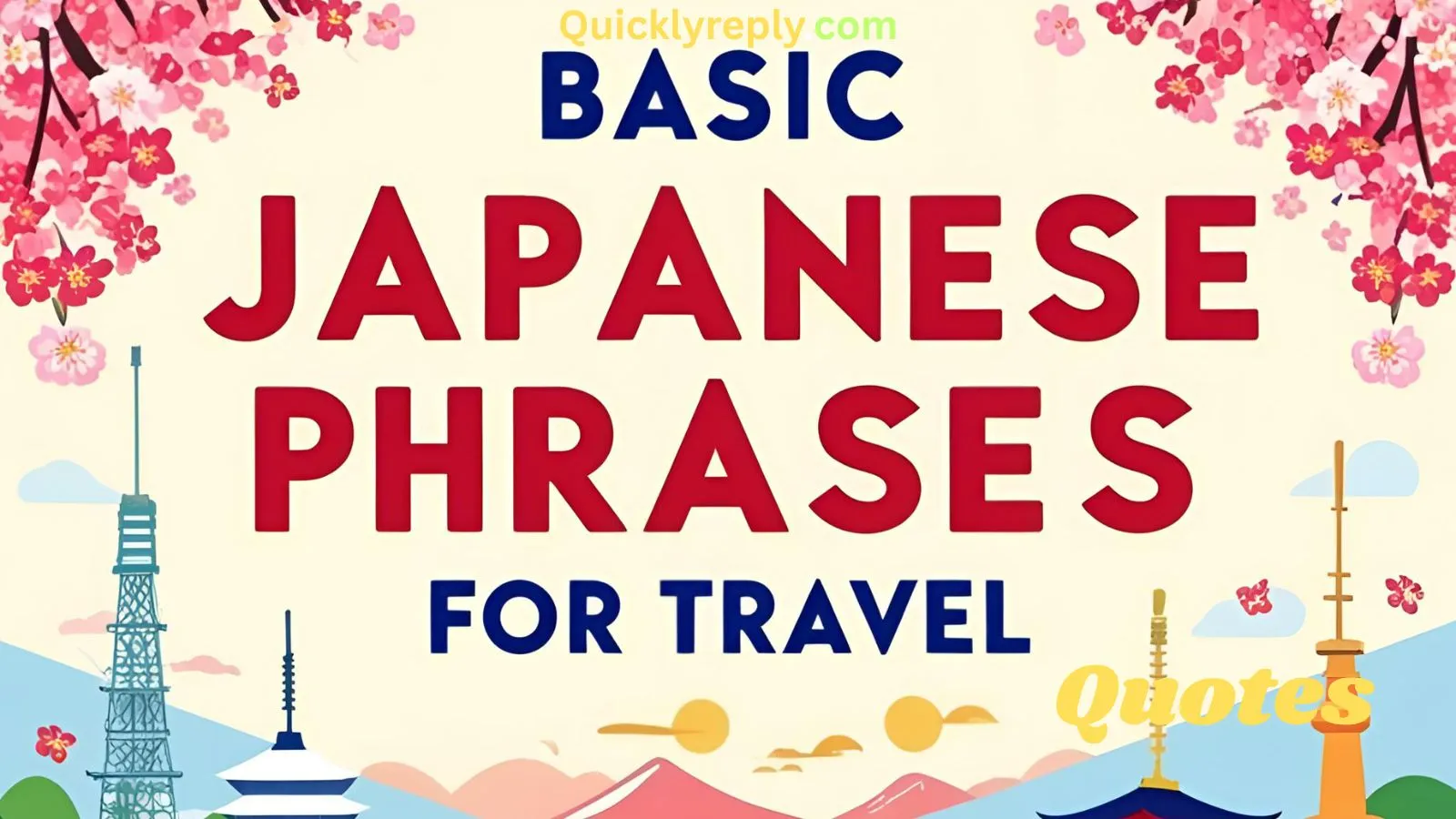Traveling to Japan soon? 🇯🇵 Whether you’re wandering through the neon streets of Tokyo or visiting peaceful temples in Kyoto, knowing some basic Japanese phrases for travel can turn your trip from good to amazing. Even a few polite words will show respect for the culture, make locals smile, and help you avoid confusion.
In this guide, we’ll explore easy and essential phrases that travelers love to use. We’ll break them into helpful categories like greetings, transportation, dining, shopping, and emergencies. Plus, you’ll get examples and real-life scenarios so you know exactly when and how to use each phrase.
Let’s dive into learning basic Japanese phrases for travel—because small words can open big doors!
📚 Why Basic Japanese Phrases for Travel Matter
When traveling in Japan, especially outside of big cities, not everyone speaks English. Having a few basic Japanese phrases at your fingertips can:
- Save you time: Find the right train, bus, or shop faster.
- Earn respect: Japanese people appreciate when visitors make an effort.
- Make connections: Even simple greetings can lead to friendly conversations.
- Handle emergencies: Quick words can make asking for help easier.
Imagine you’re lost in Osaka. Saying “Sumimasen, eki wa doko desu ka?” (Excuse me, where is the station?) will get you help much faster than just showing a map and looking confused. 🚉
Now let’s break down the most helpful basic Japanese phrases for travel by category!
🗣️ Common Japanese Greetings
Start every conversation the right way! Greetings are super important in Japan.
Konnichiwa (こんにちは) – Hello/Good afternoon
Explanation: A basic greeting for daytime.
Use When: Meeting someone or entering a shop around noon.
Example: Walk into a café at 1 p.m. and say, “Konnichiwa!”
Ohayō gozaimasu (おはようございます) – Good morning
Explanation: A polite morning greeting.
Use When: Before noon, especially in hotels or restaurants.
Example: Greet your hotel staff at breakfast with “Ohayō gozaimasu!”
Konbanwa (こんばんは) – Good evening
Explanation: A polite evening greeting.
Use When: After sunset.
Example: Walking into a night market, say, “Konbanwa” to vendors.
Sayōnara (さようなら) – Goodbye
Explanation: A formal way to say goodbye.
Use When: Leaving a longer interaction or parting from someone you just met.
Example: Thank a museum guide and say, “Sayōnara!”
Arigatō gozaimasu (ありがとうございます) – Thank you
Explanation: A respectful thank-you phrase.
Use When: Anytime someone helps you or provides a service.
Example: After paying for your ramen, say, “Arigatō gozaimasu!”
🚂 Transportation Phrases
Traveling by train, bus, or taxi? These phrases will help you move easily!
Eki wa doko desu ka? (駅はどこですか?) – Where is the station?
Explanation: Asking directions for a train station.
Use When: You’re lost in a city and need a train station.
Example: “Sumimasen, Eki wa doko desu ka?”
Kono densha wa [Tokyo] e ikimasu ka? (この電車は[東京]へ行きますか?) – Does this train go to [Tokyo]?
Explanation: Confirming your train destination.
Use When: Before boarding a train.
Example: “Kono densha wa Kyoto e ikimasu ka?”
Ikura desu ka? (いくらですか?) – How much is it?
Explanation: Asking about price (for tickets too).
Use When: Buying train or bus tickets.
Example: Point to the fare and ask, “Ikura desu ka?”
Chikatetsu wa doko desu ka? (地下鉄はどこですか?) – Where is the subway?
Explanation: Finding the subway station.
Use When: Needing fast underground transportation.
Example: Asking a passerby at Shibuya, “Chikatetsu wa doko desu ka?”
Takushī o yonde kudasai (タクシーを呼んでください) – Please call a taxi.
Explanation: Requesting help to get a taxi.
Use When: At a hotel or restaurant.
Example: Tell the hotel front desk, “Takushī o yonde kudasai.”
🍜 Dining Out Phrases
Eating out? These polite phrases will make your meal smoother.
Sumimasen (すみません) – Excuse me
Explanation: Getting a server’s attention politely.
Use When: Calling a waiter to order.
Example: Wave slightly and say, “Sumimasen!”
Menu o kudasai (メニューをください) – Please give me a menu
Explanation: Asking for the menu.
Use When: When seated without a menu.
Example: “Menu o kudasai” at a traditional restaurant.
[Sushi] o kudasai ([寿司]をください) – I’ll have [Sushi], please
Explanation: Ordering food.
Use When: Placing your order.
Example: “Rāmen o kudasai.”
Oishii desu! (美味しいです!) – It’s delicious!
Explanation: Complimenting the food.
Use When: After tasting a great meal.
Example: Tell the chef, “Oishii desu!”
Okanjō onegaishimasu (お勘定お願いします) – The bill, please
Explanation: Requesting the check.
Use When: After eating.
Example: Signal politely and say, “Okanjō onegaishimasu.”
🛍️ Shopping Phrases
Make your shopping trips easier and more fun!
Kore wa nan desu ka? (これは何ですか?) – What is this?
Explanation: Asking about an item.
Use When: In a store, market, or souvenir shop.
Example: Point to an unusual snack and ask, “Kore wa nan desu ka?”
Shichaku shite mo ii desu ka? (試着してもいいですか?) – May I try this on?
Explanation: Asking to try clothes.
Use When: At a clothing store.
Example: Holding up a kimono and asking, “Shichaku shite mo ii desu ka?”
Takai desu (高いです) – It’s expensive
Explanation: Reacting to a high price.
Use When: Trying to negotiate or express surprise.
Example: Laugh lightly and say, “Takai desu!”
Chotto kangaemasu (ちょっと考えます) – I’ll think about it
Explanation: Politely refusing or delaying a purchase.
Use When: If unsure about buying.
Example: Smile and say, “Chotto kangaemasu.”
Kore o kudasai (これをください) – I’ll take this
Explanation: Buying an item.
Use When: Ready to purchase.
Example: Hand the cashier your choice and say, “Kore o kudasai.”
🚑 Emergency and Help Phrases
Stay safe and ready with these must-know phrases.
Tasukete! (助けて!) – Help!
Explanation: Shouting for urgent help.
Use When: In emergencies like accidents.
Example: Yell “Tasukete!” if you’re hurt.
Byōin wa doko desu ka? (病院はどこですか?) – Where is the hospital?
Explanation: Finding medical help.
Use When: Injuries or feeling unwell.
Example: Ask a passerby, “Byōin wa doko desu ka?”
Keisatsu wa doko desu ka? (警察はどこですか?) – Where is the police station?
Explanation: Needing police assistance.
Use When: Reporting a problem.
Example: “Keisatsu wa doko desu ka?”
Yubiwa o nakushimashita (指輪をなくしました) – I lost my ring
Explanation: Reporting a lost item.
Use When: Informing lost-and-found.
Example: Tell station staff, “Yubiwa o nakushimashita.”
Kaze o hikimashita (風邪をひきました) – I caught a cold
Explanation: Explaining you’re sick.
Use When: Seeking pharmacy or doctor help.
Example: Tell hotel staff, “Kaze o hikimashita.”
🧳 Final Thoughts: Your Key to a Smoother Trip
Learning a few basic Japanese phrases for travel isn’t just smart—it’s fun! 🎒🌸
These simple words and expressions will help you navigate, connect, and experience Japan more deeply. Even imperfect Japanese is appreciated by locals and can turn strangers into friends.
Practice a little each day before your trip, or keep this list handy on your phone. And remember: a smile is the best phrase in any language. 😊
Happy travels and Otsukaresama desu! (Great job!)
📋 Bonus Recap Table
| Category | Phrase | Example Use |
| Greetings | Konnichiwa | Greeting a shopkeeper |
| Transportation | Eki wa doko desu ka? | Finding a train station |
| Dining | Sumimasen | Calling a waiter |
| Shopping | Kore wa nan desu ka? | Asking about an item |
| Emergency | Tasukete! | Calling for help |


Leave a Reply